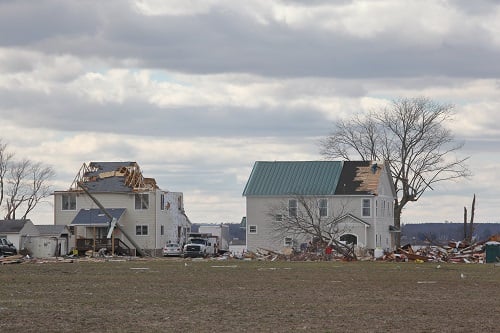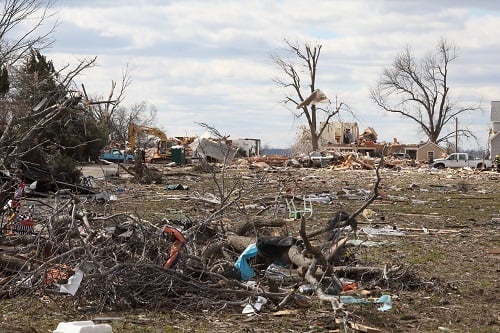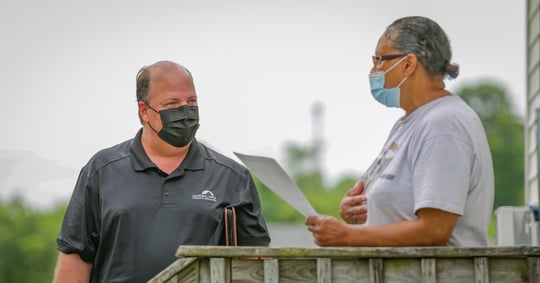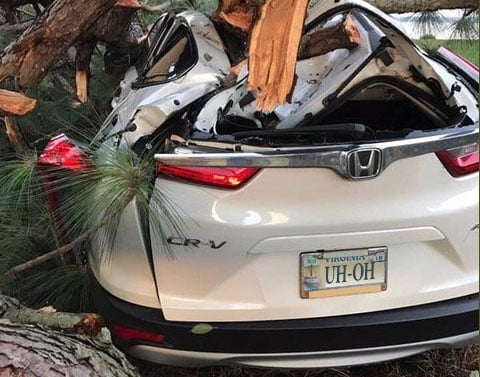
Blog cover photo credit: Flickr, Virginia Department of Transportation
We pledge to provide straight talk from our NNINS Virginia insurance experts. Read the Northern Neck Insurance INTEGRITY PROMISE.
Severe Weather in Virginia
Virginia is susceptible to all kinds of severe weather, such as torrential rain, flooding, tornados, hail, lightning, and strong winds. According to the EPA, the rising global average temperature is associated with widespread changes in weather patterns, including more severe weather. Since 1980, severe storms and tropical cyclones have been responsible for most of Virginia's billion-dollar weather events. Virginia home and property owners should learn how to prevent and reduce damage and assess their severe weather preparedness regularly.
How to protect the outside of your home from storm damage
Protect these exterior areas of your home from severe weather:
- Roof — Have your roof inspected for loose shingles, cracked tiles, and moss that holds moisture. After each storm, even in new houses, check for new leaks. A professional inspector will check your attic for water stains, light coming through the roof, and animal activity. When researching roof replacement, consider shingles rated Good or Excellent by the IBHS. Install a grounding rod if your roof is the highest point on your property to help prevent power surges and outages from lightning strikes. Power surges can damage sensitive electronic devices like TVs, computers, and phones.
- Trees — Clear your property of trees that may fall and trim dead branches and those that extend close to your home.
- Exterior HVAC Units—If your home is in a hail-prone region, install screens around its air conditioning unit to help reduce the chance of hail damage to coils and fins.
- Gutters and downspouts — Ensure your gutters are clear and undamaged, downspouts are firmly attached to the house, and leaks in gutter seams are checked. Downspouts should be connected and unbroken, and runoff should be directed at least 6 feet away from the home’s foundation to minimize the risk of basement or foundation flooding. If you're considering gutter replacement, consider upgrading to steel products, which are more durable against hail impacts and less likely to leak.
- Garage door — When you're in the market to replace your garage door, consider a wind-rated door. High winds can push a garage door inward, allowing pressure to push up on the roof and surrounding walls and damage your home. Wind-rated garage doors have been tested to withstand these pressures and can help protect your home.
- Painting, sealing, and caulking — Check and replace any cracked or missing caulking. Stain or paint structures regularly to help maintain a moisture barrier. Fill any cracks in the masonry or stucco with a mortar repair or crack sealant. Check all exterior doors, windows, and trim to determine whether the gaskets and seals are sound.
- Yard — Declutter the area outside your home to prevent damage from flying debris, including toys, patio furniture, hanging baskets, building materials, and anything that could damage your home or be damaged by severe weather. Keep your yard, porch, and patio ready, as high winds and tornadoes can arrive with little warning.
 Photo credit: Flickr, Virginia Department of Transportation
Photo credit: Flickr, Virginia Department of Transportation
How to protect the inside of your home from storm damage
Prepare these interior areas of your home for severe weather:
- Electronics and appliances — Unplug expensive electronics and appliances when severe thunderstorms are imminent. You can also install grounded outlets or a whole-house lightning surge protector to help keep electrical equipment safe from power surges.
- Doors and windows — Close and lock all exterior doors and windows and your garage door completely. Closing all interior doors can also protect your roof in high winds. If flying debris breaks a window or an exterior door blows open, your house will rapidly fill with air, causing a dangerous increase in the forces pushing on your roof, like a balloon inflating inside your house.
- Garage — Keep your garage organized and ready to park your car when severe weather is forecasted to protect it, especially from hail.
- Safe Space — Designate a safe space, such as an interior room with no windows on the lowest floor of your home, such as a basement, storm cellar, bathroom, or closet. Keep it clean, organized, and accessible for your entire family, including pets.
- Home inventory and home insurance coverage — Having a home inventory is the best way to account for your belongings in case you need to file an insurance claim. Review your insurance policy and store your insurance agent’s contact information on your phone.
Does home insurance cover home storm damage?
Northern Neck Home Insurance can protect you from all kinds of damage from severe weather, including tornados, hail, wind, lightning, hurricanes, and even earthquakes. We also offer add-on coverage for inland flood insurance, which can protect homes not covered by the National Flood Insurance Program.
If your home is damaged, your Northern Neck Insurance policy may also cover your living expenses if you need to find alternate lodging while your home is rebuilt. You may also obtain liability coverage, which can reimburse you for medical expenses and legal fees if people who are not living in your home are injured on your property.

Preparing your car for severe weather
Filling up your gas tank and even a spare gas can is a good idea. Also, charge your car's battery if it's electric and have some cash on hand. Have a good car emergency kit with a first aid kit, blanket, flares or triangle reflectors, jumper cables, a flashlight, extra batteries, an extra phone charging cable, water, and some protein bars or other healthy nonperishable snacks.
Keep your car's maintenance up-to-date
When was the last time you changed your wiper blades? If they leave streaks or make noise, it's time for new ones. While you're at it, check the air pressure in your tires. There are a few other things you can do to prepare your car for evacuation.
Be smart about where you park your car before a storm
If possible, park your car in a garage. Remember that garage doors are the weakest link in most homes during severe weather with high winds. Back in for an easy exit if needed, and consider moving items on shelves that could fall and cause damage to your car.
If you don't have a garage or your garage is prone to flooding, move your car to higher ground and park away from large trees and utility poles. If possible, park next to a sturdy building. Before you leave, double-check to ensure your windows and sunroof are completely closed, and take valuable items and important paperwork, like your car registration, with you.

Does car insurance cover storm damage?
Most severe weather damages to your car are typically covered by comprehensive car coverage. That includes damage from a tree branch or flying debris if you're driving when it occurs or your car was parked. And remember, this includes storm damage from your neighbor's tree as well as flooding of your car as long as you opt to add optional comprehensive coverage. You can speak with your agent to be sure you have it.
If you had a car accident during the severe weather, damages would be covered by the collision coverage on your policy, depending on who is at fault if another driver is involved.
Reporting a storm damage insurance claim
If you need to file a claim due to storm damage, your local agent is one of your best resources for sound advice. We are right here for you, too. Here are some handy tips on understanding home insurance claims and what to expect. These severe weather claim questions may help answer some of your questions. We appreciate your patience.
File a Northern Neck Home Insurance claim one of three ways:
- Online through the Member Portal.
- By calling your local agent.
- Contact the Northern Neck Insurance 24/7 Claims Hotline at 877-968-7252.
To file a home insurance claim, start with the following steps:
- Make safety your top priority — people first, property second.
- Shut off your home's main power or your main water supply if needed or safety is in doubt. If you smell natural gas, leave the area immediately and call 911. Have an electrician check the house before turning the power back on.
- Take wide and close-up photos and videos before making minimal temporary repairs to prevent further damage.
- Report your claim.
- Document interactions and save emails.
- Document damage to your property using a home inventory.
- If your home is unlivable, find safe shelter with a friend, family member, or hotel.
- Hold off on major repairs until they are approved by your claims adjuster.
- We recommend hiring repair reputable Virginia-licensed and certified home contractors.
- Ask for a detailed invoice from your contractor distinguishing labor charges and materials.
- Use a credit card or check for any payments you make.
- Keep all receipts for lodging, food, clothing, gas, and other necessities.
- Discuss specific claim questions with your agent and claims adjuster.
- Stay in contact with your adjuster and keep up with requested documentation, deadlines, and other requirements.
We've got you covered!
Preparing your home and car for potential severe weather in Virginia can save you money and the stress of a claim. If you do have a claim, rest assured we will work to make your experience as seamless as possible. For tips on what to do if you have storm damage to your property or car, check out our blog article on what to do if you have damage from severe weather.
THE NORTHERN NECK INSURANCE INTEGRITY PROMISE — We pledge to provide straight talk and good counsel from our NNINS Virginia insurance experts through our blog. While we hope you find this to be a helpful source of information, it does not replace the guidance of a licensed insurance professional, nor does it modify the terms of your Northern Neck Insurance policy in any way. All insurance products are governed by the terms in the applicable insurance policy.


